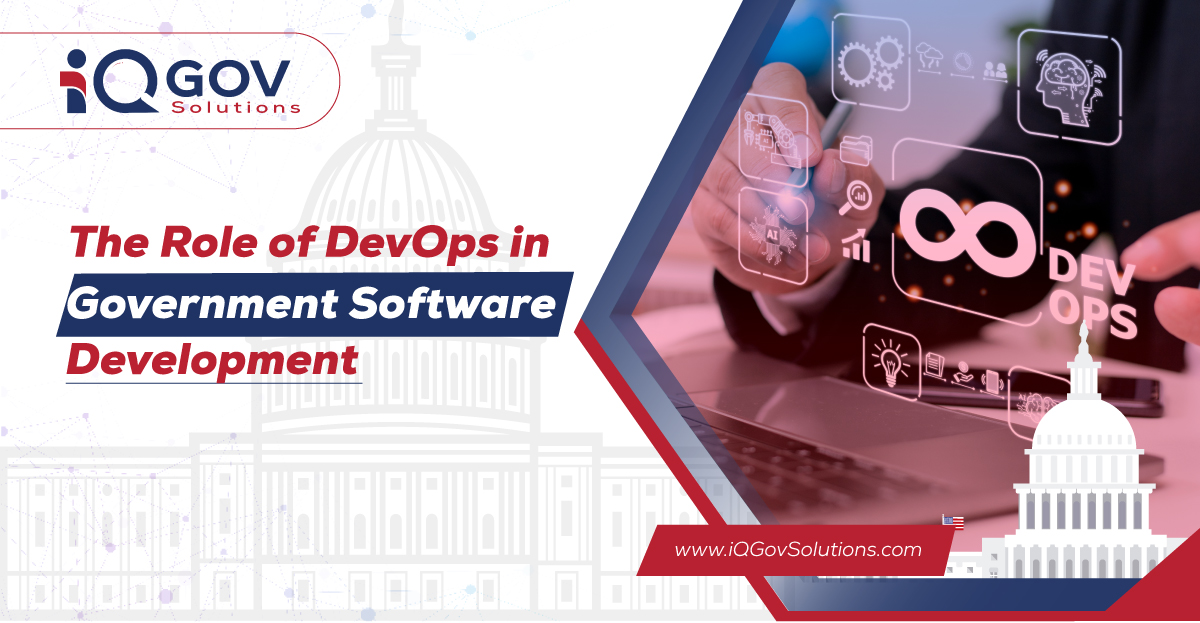In an era where digital transformation is crucial for government agencies to enhance efficiency, security, and services, traditional software development practices often don’t cut it anymore. As a result, government agencies face major challenges that include long software development cycles, isolated teams, infrastructure scalability issues, and cost overruns.
A report from the U.S. Government Accountability Office (GAO) highlights that DoD’s IT projects often experience persistent delays and inefficiencies, necessitating more agile and responsive development methodologies. These bottlenecks often delay critical service delivery and reduce the agility to respond effectively to stakeholders’ needs. To address this, DevOps is transforming government software development.
DevOps, focusing on collaboration, automation, and continuous improvement, offers a more agile and responsive approach to software development that can help government agencies overcome these obstacles. In this blog, we’ll delve into how DevOps can enhance government IT projects by improving services, enhancing security, and benefiting stakeholders in the long term.
What is DevOps and What Are its Principles
DevOps is a transformative approach to developing software and managing IT operations. It puts teamwork, automation, and ongoing improvement at the forefront. This approach brings development and operations teams closer, creating an environment where they work hand in hand throughout the entire process of making software.
The DevOps approach is governed by three main principles – Collaboration, Automation, and Continuous Improvement:
- Collaboration: DevOps encourages close cooperation among developers, operations staff, and stakeholders, which leads to faster problem-solving and shared ownership.
- Automation: Automation is at the core of DevOps. It reduces human mistakes, makes things go faster, and lets teams focus on the big picture by doing repetitive jobs. These tasks include code integration, testing, and deployment, reducing errors and freeing up teams for strategic work.
- Continuous Improvement: DevOps implements practices like Continuous Integration (CI) and Continuous Delivery (CD) to deliver incremental updates, quickly address issues, and refine processes based on feedback.
Benefits of DevOps in Government Software Development
- Better Collaboration and Communication: Government projects often involve multiple departments and stakeholders. DevOps promotes collaboration and communication across these diverse groups and breaks down silos, and ensure that all teams work towards shared goals. Specifically, the GAO’s “Agile Assessment Guide” discusses how Agile and DevOps practices help improve collaboration and communication within federal projects by streamlining processes and enabling more frequent feedback and updates. This type of collaboration facilitates transparency and reduces communication gaps, which is an important culture for achieving successful project delivery.
- Improved Quality and Reliability: The quality standards of government software are stringent because it must remain trustworthy to the people and ensure operational efficiency. DevOps results in fewer defects and higher software reliability with automated testing, continuous integration, and continuous delivery, helping deliver high-quality software that meets user expectations and regulatory requirements by detecting issues early in the development process.
- Enhanced Security and Compliance: Security is a top priority for government IT projects. DevOps practices like integrating security into the development pipeline (DevSecOps) automate security testing and compliance checks. This proactive approach reduces vulnerabilities, builds system resilience, and meets regulatory frameworks (such as FISMA standards from NIST), thus protecting sensitive information and preserving public trust.
- Better Resource Utilization: Government agencies often have to work with tight budgets. DevOps optimizes resource use by smoothing workflows, automating repetitive tasks, and reducing manual work. Consequently, this efficiency further helps to save costs that would have been used for better purposes, such as innovative and stakeholder-centric initiatives rather than maintenance and remediation activities.
- Increased Efficiency and Faster Delivery: Once developed within governmental organizations, traditional IT projects are known to take longer in completion cycles. This is facilitated through DevOps, which shortens delivery timeframes through automation and continuous delivery practices. According to the “Government Trends 2021” report by Deloitte, 78 percent of U.S. government executives recognize that agile and DevOps methodologies substantially impact their organizations. Besides accelerating the deployment rate for updates and new features, DevOps enhances agility and responsiveness to changed stakeholder needs and regulatory requirements.
Challenges and Solutions in Implementing DevOps in Government
- Cultural Resistance: Most government agencies have set cultures that don’t like change and a top-down structure. This also means people are doubtful about working together or using machines. To get past this resistance, it’s key to have leaders on board and plans to manage change. Teaching people how DevOps helps, creating a culture where everyone keeps learning and getting better, and showing early wins through test projects can help build trust and get people excited about DevOps ways of doing things.
- Legacy Systems: Many government agencies still use old systems that are tricky, big, and hard to update. Merging such systems with agile DevOps practices can be overwhelming. A phased modernization approach should be adopted whereby the first step is to identify areas that need immediate improvement and then refactor or replace the components of these outdated software applications. Automated testing and deployment pipelines must be directed at enhancing the agility and dependability of legacy systems to avoid disruption to ongoing activities.
- Security Concerns: In government IT environments, sensitive data, and critical infrastructure must be protected against evolving threats. Securing Software Development Lifecycle (S-SDLC) promotes collaboration between development, operations, quality assurance teams, and security so that secure products can be produced faster throughout their life cycle.
- Skill Gaps: Government IT teams may lack the skills and expertise required to implement and manage DevOps tools and practices efficiently. The need of the hour would be to sponsor training initiatives that will upgrade team members’ abilities to the desired levels, engage a third-party consultant with knowledge of DevOps who can train company staff, and develop a culture of sharing information among different teams to speed up learning new technologies.
DevOps plays a pivotal role in government software development by breaking down silos between teams and fostering collaboration, automation, and continuous delivery. At iQ GovSolutions, we specialize in implementing DevOps to accelerate software deployment, ensure security and compliance, and enhance scalability. Our approach integrates automated testing, infrastructure as code, and continuous monitoring to optimize workflows and drive innovation. Contact us today to discover how our tailored DevOps expertise can propel your agency, department, or office toward digital transformation and streamlined efficiency.


